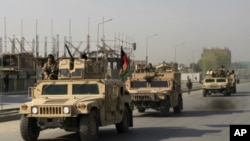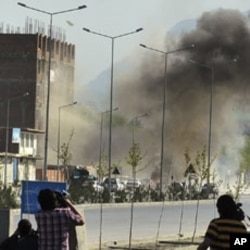After early morning explosions and heavy gunfire on Monday shook the Afghan capital and three other Afghan provinces, the Ministry of Interior says fighting that began a day earlier has now ended. Authorities say more than 30 insurgents were killed in the attacks, as well as some soldiers, police officers and civilians.
Hajji Matullah Seddiqi was finishing up his lunch on Sunday afternoon with his wife and two children when he heard gunshots. He looked outside and saw one of the gunmen's vehicles.
“It's a big car, a land cruiser I think, its black," he said. "One man when he dropped down on the street he just fire, fire and the people are going, they want to empty the street first and they shot down on one people, one soldier.”
He said the men shot several people before entering a nearby building, beginning an 18-hour standoff that ended early Monday. Seddiqi spent nearly all of it hiding with his family in his parent's basement.Afghan and international forces finally put down the assault following pre-dawn assaults by U.S.-led coalition helicopters. The Ministry of Interior reports the fighting has also ended in the eastern cities of Jalalabad, Gardez and Pul-e-Alam, where suicide bombers tried to storm a NATO base, an airport and police installations.
General Carsten Jacobson, the spokesman for NATO's International Security Assistance Force, says the coordinated attacks all employed the same tactics.
“Small groups, packages of handful or less, insurgents infiltrating mainly into buildings, using them as firing platforms, to indiscriminately to fire rocket-propelled grenades and machine weapons into government or military installations, more to gain effect than to cause real damage,” he said.
The ISAF spokesman praised the increased capability of the Afghan-led forces, mostly police with support from the army, that battled and defeated the insurgents. NATO provided air support in response to requests from the Afghans.
The goal of the small insurgent attacks, Jacobson says, was not to militarily defeat the Afghan forces, but to shake people's confidence and instill fear. The violence did show that the Taliban and their allies are still a determined enemy.
Shukria Barakzai, a member of the Afghan parliament's defense committee, says the ability of the Taliban to infiltrate the heart of the capital raises real concerns about the security challenge facing government forces as U.S. and NATO forces draw down. The majority of international combat troops are scheduled to leave by the end of 2014.
“Mentally you can put yourself in the position of Afghan people, who for 18 hours, non-stop fighting and war," said Barakzai. "It's unbelievable. It's really unbelievable.”
On Sunday, a Taliban spokesperson claimed responsibility for the multiple assaults on embassies, government buildings and NATO bases, saying the operation had been planned for two months to show the insurgency's power after NATO commanders called the Taliban weak.
It was the most widespread attack in the Afghan capital since an assault on the U.S. Embassy and NATO headquarters in September. That operation was blamed on the Haqqani network, a Pakistan-based insurgent group allied with the Taliban.
Afghan Interior Minister General Bismillah Mohammadi says the arrest and interrogation of a militant armed with explosives in Jalalabad indicates the Haqqini network may also be behind the latest attacks.
He says the man confessed that he came from outside of the Afghan border, and was trained and equipped there by elements of the Haqqani network.
The attacks come at a time of increased tension between international and Afghan forces over incidents including the burning of Qurans at a U.S. base and a deadly attack by a U.S. soldier that killed 17 Afghan villagers.
NATO and U.S. leaders say despite some setbacks, plans to shift international forces from a combat to support role are moving forward, and the capable response by Afghan forces to the latest attacks is a sign of progress.










